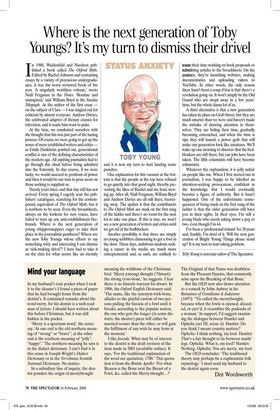Mind your language
In my husband’s coat pocket when I took it to the cleaner’s I found a piece of paper that he had brought home from the dentist’s. It contained remarks about the word merry, for his dentist is a well-read man of letters. I should have written about this before Christmas, but it was still hidden in the pocket.
‘Merry is a spectrum word,’ the notes say. ‘At one end is the old northern meaning of “strong” or “brave”; at the other end is the southern meaning of “jolly”, “happy”.’ The northern meaning he says is in the dialect dictionary. I can’t find it in this sense in Joseph Wright’s Dialect Dictionary or in the 10-volume Scottish National Dictionary. No matter.
In a subsidiary line of inquiry, the dentist ponders the origin of merrythought meaning the wishbone of the Christmas bird. ‘Merry (strong) thought (?thwart): the strong cross-bone,’ he suggests. I fear there is no historic warrant for thwart. In 1906, the Oxford English Dictionary said: ‘The name, like the synonym wish-bone, alludes to the playful custom of two persons pulling the furcula of a fowl until it breaks; according to the popular notion, the one who gets the longer (in some districts, the shorter) piece will either be married sooner than the other, or will gain the fulfilment of any wish he may form at the moment.’ I like furcula. What may be of interest to the dentist is the draft revision of the item made in 2001 (available online). It says, ‘For the traditional explanation of the word see quotation, 1708.’ This quotation is from the British Apollo: ‘For what Reason is the Bone next the Breast of a Fowl, &c. called the Merry-thought...? The Original of that Name was doubtless from the Pleasant Fancies, that commonly arise upon the Breaking of that Bone.’ But the OED now also draws attention to a remark by John Aubrey in his Remaines of Gentilisme & Judaisme (1697): ‘’Tis called the merrythought, because when the fowle is opened, dissected, or carv’d, it resembles the pudenda of a woman.’ In support, I’d suggest examining the dialogue between Hamlet and Ophelia (act III, scene ii). Hamlet: Do you think I meant country matters? Ophelia: I think nothing, my lord. Hamlet: That’s a fair thought to lie between maids’ legs. Ophelia: What is, my lord? Hamlet: Nothing. Ophelia: You are merry, my lord.
The OED concludes: ‘The traditional theory may perhaps be a euphemistic folk etymology.’ I must send my husband to the dentist again soon.
Dot Wordsworth


















































































 Previous page
Previous page